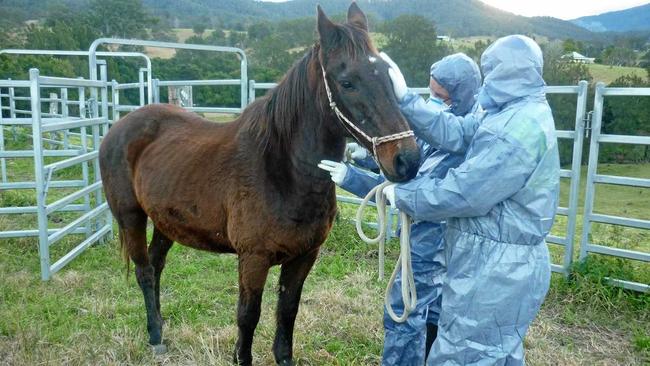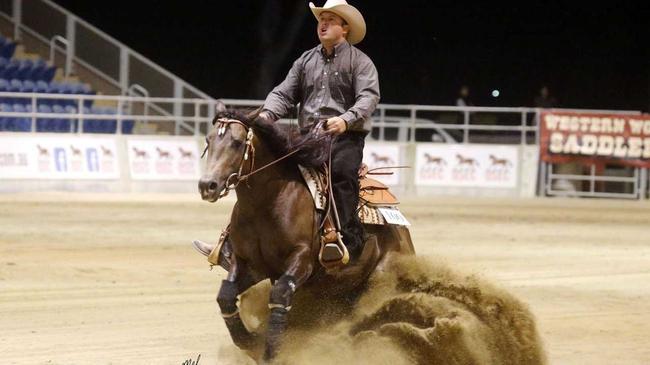Hendra vaccine could have saved lives, vet tells inquiry
VETS who have died from Hendra virus might still be alive if a vaccine had been available, Queensland parliamentary inquiry hears.

Mackay
Don't miss out on the headlines from Mackay. Followed categories will be added to My News.
VETS who have died from Hendra virus might still be alive if a vaccine had been available, a Clermont vet who was exposed to the deadly disease has told a Queensland parliamentary inquiry.
Tessia Salmond was exposed to the deadly Hendra virus in 2009 - but told a parliamentary inquiry she still treats horses who haven't been vaccinated against the disease.
In a submission to the Queensland parliamentary inquiry into the Hendra vaccine, Clermont vet Dr Salmond said in 2009 she was working in Bowen and visited a friend's horse that was lame.
The horse in fact had the deadly Hendra disease and Queensland Health said Dr Salmond had a "very high risk" of having contracted the disease.
"This just goes to show that Hendra virus can present really as any illness in a horse, which makes a job very difficult and dangerous," she said.
"I had to go through extensive blood testing regimes and an agonising wait to then find out I was extremely lucky not to have caught the virus."
She said the vets who died from Hendra may still be alive had the vaccine been widespread years ago.
Dr Salmond said the Workplace Health and Safety prosecution of three vets who had treated unvaccinated horses was "frightening" but had not stopped her treating all sick horses.
"The whole Workplace Health and Safety issue is frightening. It feels like they are making vets the scapegoats," she said.
But some horse owners have expressed concern about reactions they claim the vaccine causes.
Moranbah horse owner Michelle Ross told the inquiry she felt vets were "forcing" owners to vaccinate horses against their will by threatening not to treat ill unvaccinated animals.
"I fell that it's unfair that vets are going down the road and forcing horse owners to vaccinate," she said.
Ms Ross said she vaccinated her four horses and they all had reactions. She said she believed the vaccine caused cancer to spread faster in one horse.
She said if vets wore protective equipment they would not be at risk of contracting the disease.
Inquiry chair, Gladstone MP Glenn Butcher, said a rift had opened up between some horse owners and vets.

Vaccine convert wins reining comps
BEN Ryan had heard horror claims about the Hendra vaccine - lame horses, a dodgy approvals process, vets not treating sick unvaccinated horses.
He didn't want to vaccinate his Pekarra Dazzling Deputy that he planned to enter in a number of prestige reining competitions.
But when a part-owner and a trusted vet insisted the vaccine was safe and necessary if he wanted to compete in certain horse competitions, Mr Ryan relented.
"Even though I took his word on it, I was still a little apprehensive about the vaccination and the idea of it possibly jeopardising a successful outcome at the reining show," he said.
Pekarra Dazzling Deputy went on to win two of Queensland's most prestigious reining competitions, the Pacific Coast Reining Futurity and the Queensland Open Reining Futurity.
But the success hasn't convinced Mr Ryan the vaccine should be mandatory.
"I don't think anyone should be forced to vaccinate their horses," he said.
"I think at the end of the day it should be up to the owner and what they feel comfortable with."
How dangerous is Hendra?
SEVEN humans have caught Hendra virus, four have died.
The latest figures show there have been 41 outbreaks of Hendra virus in Queensland - all involving horses getting infected. As a result, 73 horses have died or been euthanised.
The Australian Veterinary Association says if a person catches Hendra, their chance of dying is 57%. If a horse catches it, its chance of dying is 79%.
So far, there is no evidence humans can catch Hendra direct from a bat. It appears humans can only get infected from a horse.
The Queensland parliamentary inquiry into the Hendra vaccine is examining reported side effects from the vaccine and vets refusing to treat horses that have not been vaccinated.
It came after complaints from horse owners that after the vaccine horses were showing symptoms ranging from swelling, stiff necks and lethargy through to inability to stand and even to death.
The inquiry is also looking at how vets are approaching treating unvaccinated horses after Workplace Health and Safety launched prosecutions against three vets for not taking reasonable care because they allegedly failed to wear protective equipment when examining unvaccinated horses.
The committee is due to deliver its report on October 22.
ARM NEWSDESK


